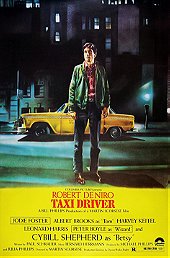Taxi Driver was released in a period when American Hollywood was going through a series of alterations. The film served as a crucial example that illustrated how Hollywood has changed from the classic era, particularly through its independent filmmaking techniques and the implementation of more oppressive themes. Taxi Driver also became a crucial feature in the career of Martin Scorsese as it introduced his own techniques of violence and crime in America, which progressively became his directorial style. For these reasons, Taxi Driver is one of Martin Scorsese’s masterpieces as well as an important benchmark in the crime genre.
Martin Scorsese has become widely recognized as the kingpin director of mafia and criminal-based films. However before gaining this reputation, Taxi Driver became arguably the benchmark that began it all; in fact, it was his first masterpiece. Before audiences see a character turn criminal, it is important to first witness psychological background and the motives, which is what we see in Taxi Driver. Even after many films that Scorsese has directed over the past 40+ years, we have rarely seen central characters expressing psychological issues as opposed to their criminal lives. In fact, we perhaps have not seen a better thought-provoking and more personal Scorsese feature since. His direction in displaying these conditions as well as the oppressive atmosphere in New York connected beautifully and has consequently left us with a landmark of the crime-drama sub-genre.
Taxi Driver has negativity and depression written all over it but not which is tear-jerking. The majority of the film appears natural with traditional landscapes of Manhattan, New York. However, it is Taxi Driver’s time-setting and circumstances that portrays The Big Apple rather darkly and somewhat horrifying. While Taxi Driver introduces psychoanalysis, it also illustrates how economically and socially low the United States of America, even in New York City, has become following their withdrawal and defeat in the Vietnam War. In addition, we witness individuals in a society who are associated with either forms of prostitution or violence. Seeing as it was filmed in 1976 and the Vietnam War ended in 1975, audiences actually do witness America at that present time.
Although the legendary Robert De Niro’s rise to fame began with his Oscar-winning performance in The Godfather: Part II, we hadn’t yet seen his breakthrough in a leading role. Re-uniting with Scorsese again after Mean Streets, De Niro delivers a ground-breaking performance, arguably his greatest of all time, as the eccentric and lonesome Travis Bickle. This character symbolizes the consequences of both witnessing and experiencing trauma in a social and personal environment. Travis is a good man but is beaten down by loneliness and obsession to sink lower and complete his pathway to insanity. De Niro’s simplicity and politeness as Travis pulled off marvellously as did his portrayal of the character whilst in his criminal state.
Furthermore, hats go off to the supporting cast in Taxi Driver. At only 12 years old, Jodie Foster goes the distance in her portrayal of child-prostitute Iris. Her performance is absolutely wonderful but how we feel about the character is a mixed bag. It is shocking to see one so young appear and act so sexually explicit but Foster portrays this in a mesmerizing manner. In fact, Iris’ appearance and her nature add a further oppressive tone to what New York City and its citizens have become. Foster’s chemistry with De Niro is unique but superb and her role is among the greatest child-star performances of all time. Finally, we witness appearances from Harvey Keitel, Cybill Shepherd and Albert Brooks and they each deliver solid performances.
Taxi Driver is powerful American filmmaking displaying America practically in the gutter. This adds a rather uniquely creative value behind it as the film examined the brutal manipulation of the mind, something not so popular during that production period. Only Martin Scorsese could have pulled it off and his approach and execution to psychological depth has never gone any higher. Nevertheless, this psychological-drama is arguably the greatest achievement in Martin Scorsese’s directorial career, features iconic performances from De Niro and Foster and, finally, makes its mark as a benchmark of the New Hollywood era.
10/10
 Login
Login